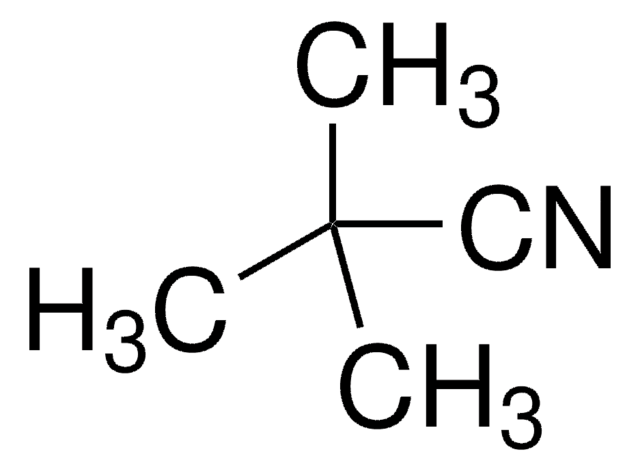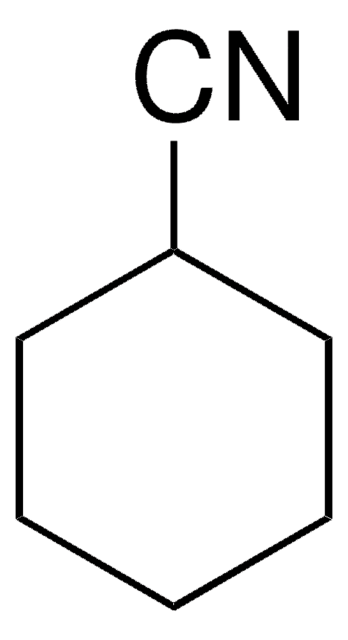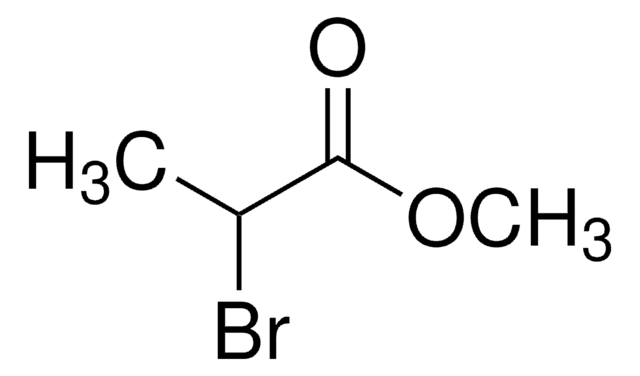All Photos(1)
About This Item
Linear Formula:
(CH3)2CHCH2CN
CAS Number:
Molecular Weight:
83.13
EC Number:
MDL number:
UNSPSC Code:
12352100
PubChem Substance ID:
NACRES:
NA.22
Recommended Products
Quality Level
Assay
98%
form
liquid
refractive index
n20/D 1.393 (lit.)
bp
128-130 °C/730 mmHg (lit.)
density
0.795 g/mL at 25 °C (lit.)
functional group
nitrile
SMILES string
CC(C)CC#N
InChI
1S/C5H9N/c1-5(2)3-4-6/h5H,3H2,1-2H3
InChI key
QHDRKFYEGYYIIK-UHFFFAOYSA-N
General description
Isovaleronitrile induced Rhodococcus ATCC 39484 produced a nitrilase.
Application
Isovaleronitrile was used in the synthesis of a new type of nitrilase, arylacetonitrilase by Alcaligenes faecalis JM3 cells.
Signal Word
Danger
Hazard Statements
Precautionary Statements
Hazard Classifications
Acute Tox. 3 Oral - Eye Irrit. 2 - Flam. Liq. 3 - Skin Irrit. 2 - STOT SE 3
Target Organs
Respiratory system
Storage Class Code
3 - Flammable liquids
WGK
WGK 3
Flash Point(F)
82.4 °F - closed cup
Flash Point(C)
28 °C - closed cup
Personal Protective Equipment
dust mask type N95 (US), Eyeshields, Gloves
Choose from one of the most recent versions:
Already Own This Product?
Find documentation for the products that you have recently purchased in the Document Library.
Luyang Cai et al.
Water research, 177, 115803-115803 (2020-04-18)
Previous studies have focused on investigating the formation of odorous by-products during the chlorination of free amino acids (AAs). However, studies on the formation of odorous by-products during the chlorination of combined AAs, which are much more abundant in natural
T Nagasawa et al.
European journal of biochemistry, 194(3), 765-772 (1990-12-27)
A new type of nitrilase, arylacetonitrilase, has been purified from isovaleronitrile-induced cells of Alcaligenes faecalis JM3 in four steps. The purity of the enzyme was confirmed by SDS/polyacrylamide gel electrophoresis, ampholyte electrofocusing and double immunodiffusion in agarose. The enzyme has
D E Stevenson et al.
Biotechnology and applied biochemistry, 15(3), 283-302 (1992-06-01)
Rhodococcus ATCC 39484 produced a nitrilase when induced with isovaleronitrile. The enzyme was obtainable pure in milligram amounts, had a subunit Mr of 40 kDa, and demonstrated a substrate-induced activation related to aggregation of subunits to form a 560-kDa complex.
Ji-Dong Shen et al.
Critical reviews in biotechnology, 41(1), 72-93 (2020-10-14)
Nitrilases are widely distributed in nature and are able to hydrolyze nitriles into their corresponding carboxylic acids and ammonia. In industry, nitrilases have been used as green biocatalysts for the production of high value-added products. To date, biocatalysts are considered
Our team of scientists has experience in all areas of research including Life Science, Material Science, Chemical Synthesis, Chromatography, Analytical and many others.
Contact Technical Service










